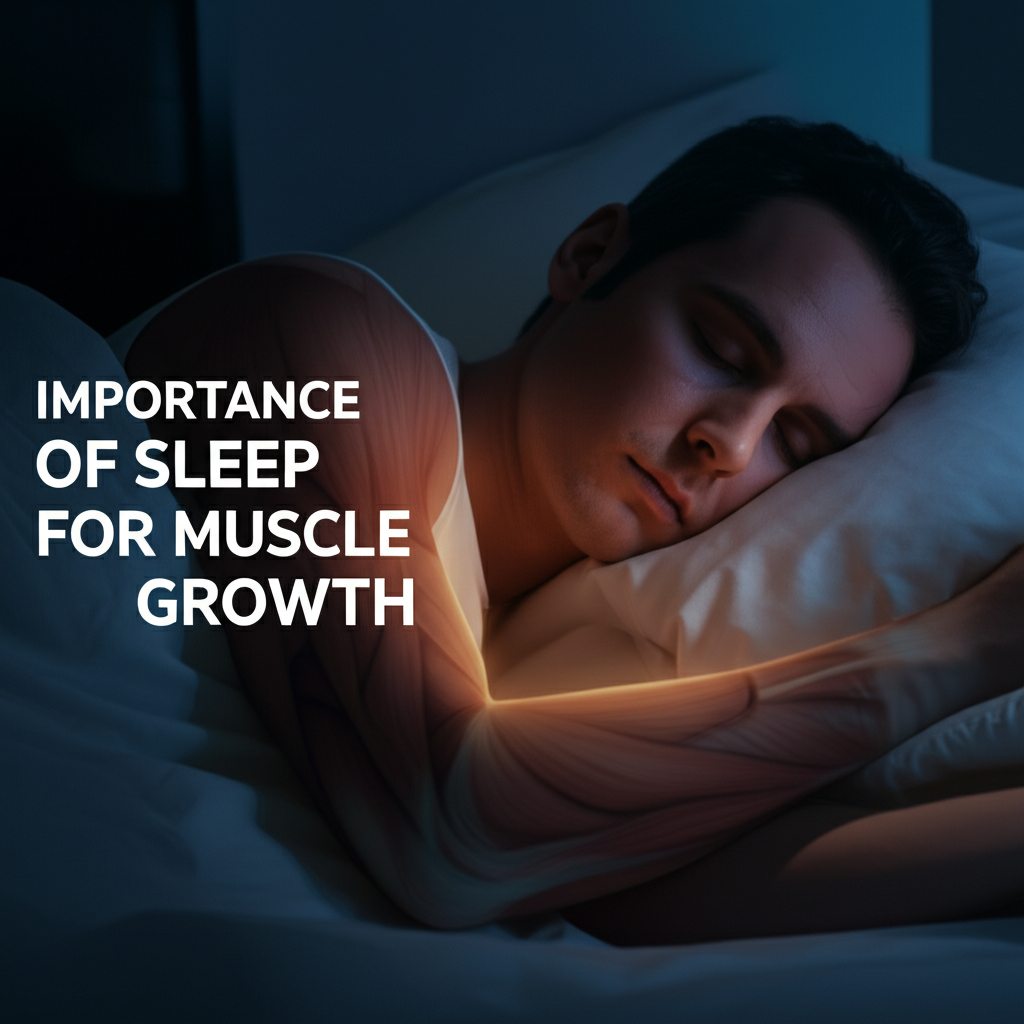Importance of Sleep for Muscle Growth

Sleep is crucial for muscle growth, recovery, and overall repair. Prioritizing quality sleep ensures your body can perform these vital functions, leading to better gains and improved performance.
Key Takeaways

- Muscle repair and growth happen during sleep.
- Hormones essential for muscle building are released at night.
- Adequate sleep reduces muscle breakdown.
- Better sleep means improved workout performance.
- Consistent sleep enhances recovery speed.
Are you hitting the gym hard, powering through tough workouts, and fueling your body with protein, only to feel like you’re not seeing the muscle growth you desire? You might be overlooking one of the most critical pieces of the puzzle: sleep. Many people focus intensely on training and nutrition, but the profound impact of sleep on muscle growth often gets sidelined. If you’re wondering why your progress feels slow or if you’re just curious about how sleep fits into your fitness journey, you’re in the right place. This guide will break down the importance of sleep for muscle growth in a simple, step-by-step way, helping you understand why hitting the hay is as important as lifting the weights.
Understanding Muscle Growth and Sleep’s Role
When you work out, especially with resistance training, you create tiny tears in your muscle fibers. This might sound counterintuitive, but it’s the first step in building bigger, stronger muscles. Your body then goes into repair mode, using protein to rebuild these damaged fibers. The remarkable part? It doesn’t just repair them to their previous state; it rebuilds them stronger and slightly larger to better handle future stress.
This entire repair and rebuilding process is heavily influenced by sleep. Think of sleep as your body’s dedicated time for maintenance and construction. During waking hours, your body is busy with daily activities, responding to stimuli, and performing countless tasks. It doesn’t have the focused time and resources needed for significant muscle repair. Sleep provides this crucial window. During different sleep stages, especially deep sleep, your body releases hormones that are vital for muscle protein synthesis, tissue repair, and overall recovery. Without enough quality sleep, this process is significantly hampered.
The Science Behind Sleep and Muscle Building
To truly appreciate the importance of sleep for muscle growth, let’s dive a bit deeper into the science. Our bodies are complex systems, and sleep triggers a cascade of physiological events that are essential for muscle development. Understanding these processes can motivate you to prioritize your rest like you prioritize your workouts.
Hormonal Powerhouse: Growth Hormone and Testosterone
Two key hormones play a starring role in muscle growth: Human Growth Hormone (HGH) and testosterone. Both are primarily released during sleep, particularly during the deeper stages.
- Human Growth Hormone (HGH): This hormone is essential for cell regeneration, muscle growth, and bone development. Studies have shown that the majority of HGH secretion occurs during deep sleep. When you cut your sleep short, you directly reduce the amount of HGH your body produces, thereby hindering muscle repair and growth. For example, research published in the American Journal of Physiology demonstrated a significant increase in HGH release during sleep.
- Testosterone: While often associated with men, testosterone is present in both sexes and is critical for muscle protein synthesis and building lean muscle mass. Studies, including one from the Mayo Clinic, indicate that testosterone levels can decrease with sleep deprivation. Short sleep duration has been linked to lower testosterone levels, which can negatively impact your ability to build and maintain muscle.
Cortisol: The Muscle-Eroding Antagonist
On the flip side, sleep deprivation can lead to increased levels of cortisol, a stress hormone. While cortisol has important functions, chronically elevated levels are detrimental. Cortisol can promote the breakdown of muscle tissue (catabolism), essentially working against your muscle-building efforts. It can also contribute to fat storage. Getting adequate sleep helps regulate cortisol levels, keeping them in check and protecting your hard-earned muscle.
Protein Synthesis: The Building Blocks
Muscle protein synthesis (MPS) is the process your body uses to repair and build muscle tissue. This process is most active when you are in a state of positive nitrogen balance, meaning you are consuming enough protein and your body is efficiently using it. Sleep provides the optimal environment for MPS to occur efficiently. When you sleep, your body can dedicate its resources to utilizing the protein you’ve consumed to repair and build muscles without the demands of the day.
The Impact of Insufficient Sleep on Muscle Growth
Missing out on sleep isn’t just about feeling tired; it has tangible negative effects on your ability to build muscle. These effects can undermine all your hard work at the gym and in the kitchen.
1. Impaired Muscle Recovery
When you don’t get enough sleep, your body’s ability to repair muscle damage from training slows down. This means you might take longer to recover between workouts, and your muscles won’t get the chance to rebuild effectively. This can lead to persistent soreness and a higher risk of injury.
2. Reduced Strength and Performance
Sleep deprivation affects your neuromuscular function, which is how your nerves communicate with your muscles. This can lead to decreased strength, power, and endurance during your workouts. You might find yourself lifting less weight, doing fewer reps, or feeling fatigued much sooner than usual. This diminished performance directly impacts your ability to stimulate muscle growth effectively.
3. Increased Muscle Breakdown
As mentioned, elevated cortisol levels due to lack of sleep can lead to muscle catabolism. Instead of building muscle, your body might start breaking down existing muscle tissue for energy, which is the opposite of what you want for muscle growth.
4. Poor Nutrient Utilization
Sleep plays a role in how your body processes nutrients. When you’re sleep-deprived, your body’s ability to utilize carbohydrates efficiently and regulate hormones like insulin can be impaired. This can affect energy levels for workouts and how well your body uses protein for muscle repair.
How Much Sleep Do You Really Need for Muscle Growth?
The general recommendation for adults is 7-9 hours of quality sleep per night. For individuals focused on muscle growth, aiming for the higher end of this spectrum, or even slightly more, is often beneficial. More intense training regimens and the body’s increased need for repair can mean requiring a bit extra rest.
It’s not just about the quantity but also the quality
